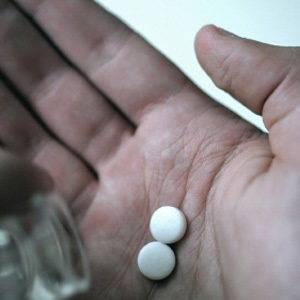
However, "people who are aspirin-resistant have an increased chance of having a heart attack or stroke," says Dr Patricia Gum, lead author of a new study on the subject.
Aspirin not always efficient
Aspirin helps prevent heart attacks and strokes by blocking the formation of a chemical in the body called thromboxane, which makes platelets sticky and helps to promote blood clotting.
But for some people, aspirin doesn't block this chemical, thus eliminating aspirin's protective effect.
Aspirin resistance tested
Gum and her colleagues from the US Cleveland Clinic studied 326 patients with stable cardiovascular disease. These patients had been taking daily doses of 325 milligrams of aspirin for a week or more when enrolled in the study, according to a report in the March 19 issue of the Journal of the American College of Cardiology.
The researchers then tested for aspirin resistance. They found that 17 patients were aspirin-resistant. All the patients were followed for almost two years. During that time, four of the 17 patients (24 percent) who were aspirin-resistant had a heart attack or stroke or died, compared with 30 of the 309 patients (10 percent) who were not aspirin-resistant.
An important diagnosis
"We now have more evidence that the diagnosis of aspirin resistance is a clinically real and important diagnosis, which has clinical implications," Gum says.
These results confirm those of another study, published last year, which used data from the Heart Outcomes Prevention Evaluation (HOPE) study. The results of that study showed that among patients with cardiovascular disease who were taking aspirin, there was a 3,5-fold increase in the risk of death from heart attack for those who were aspirin-resistant, compared with those who were not.
It may be premature to recommend that people be tested for aspirin resistance until better tests are developed, Gum says. However, testing for aspirin resistance may become standard in the future, she adds.
Early stages
For those who are aspirin-resistant, a drug called Plavix (clopidogrel) may be a good substitute, Gum says. However, this needs to be confirmed in a large clinical trial, she stresses.
Gum notes the researchers are in the early stages of determining the clinical implications of aspirin resistance for those at risk for cardiovascular disease. However, "I believe that aspirin resistance is clinically important, and patients taking aspirin to reduce their risk of heart attack should talk with their physician about this problem," she says.
More research needed
Dr Robert Califf, professor of cardiology at the US Duke University School of Medicine, says, "the importance of this study is that it not only gives us information about who may need clopidogrel, but it may also give us clues about who can do well with aspirin alone."
He adds that much larger studies are needed to "sort out the clinical implications of this complex individual response. It's fascinating to reflect on how little we know about aspirin dosing more than 100 years after the introduction of aspirin as a therapeutic agent." – (HealthScout News)




 Publications
Publications
 Partners
Partners














